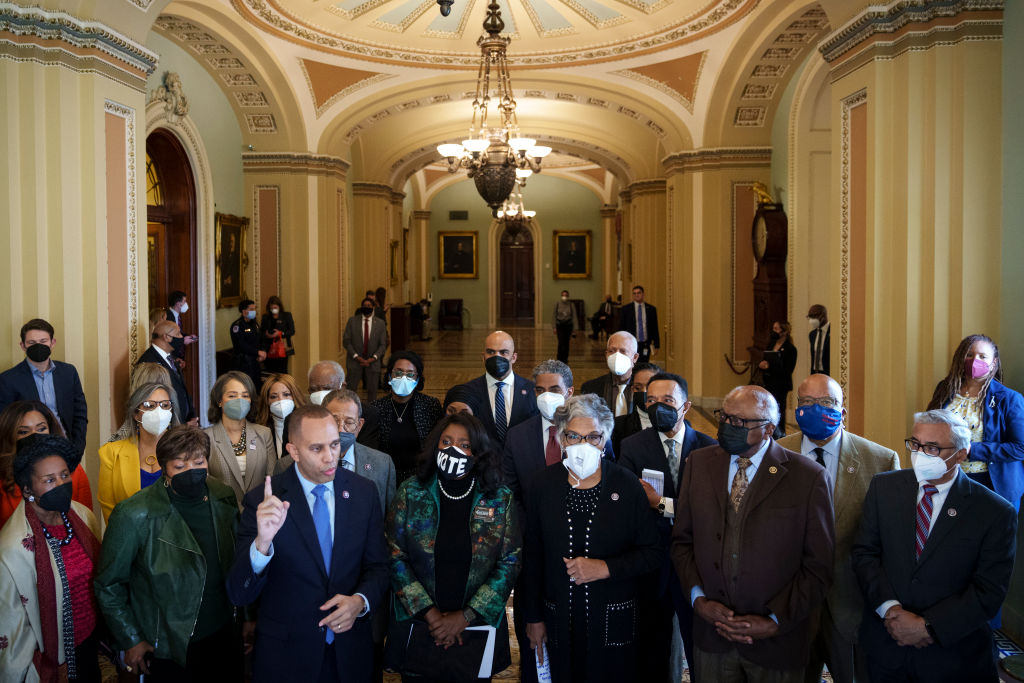
This article is part of the The DC Brief, TIME’s politics newsletter. Sign up here to get stories like this sent to your inbox every weekday.
It’s sometimes tough to handle, but a multitude of things can simultaneously be true. Consider the current predicament facing President Joe Biden: his poll numbers have tanked, his agenda is stalled and even his fellow Democrats are not-so-quietly gnashing about how the second year of his presidency is shaping up. And yet he’s presiding over an economy that any of his fellow members of The Presidents Club would covet, and just this week the U.S. military took out an ISIS leader and disrupted a Russian disinformation campaign.
So what is really keeping Democrats up at night? Two possibilities, each as valid as the other. In the first, Republicans—with the assistance of at least two Democrats—won’t let a pair of voting-rights bills get through the Senate with a bare majority, nixing ideas like making Election Day a holiday and guaranteeing early voting. To hear the Democratic backers of the voting rights package tell it, democracy itself is at risk if it doesn’t pass, and Republicans are sending the United States in the abyss of autocracy.
In the second, voters—and especially Black voters—watch Washington lawmakers fail to deliver on campaign promises as their state legislators take aggressive steps to curb easy access to ballots from coast to coast. Voters of color are disproportionately impacted by this wave of voting restrictions, which in turn is likely to drive down both their ability and interest to cast ballots in this November’s midterm elections. In the states, more than 400 bills were introduced in 49 states last year to tighten-up access to ballots, according to the pro-democracy Brennan Center for Justice at New York University. The efforts are in pursuit of a fix to a problem that isn’t significant; an Associated Press survey of the 2020 election found fewer than 475 cases of voter fraud—a sum that would not have made a lick of difference.
“There’s more than just an attack on voting rights. This is straight-up Jim Crow-era voter suppression,” says Lavora Barnes, the chairwoman of the Michigan Democratic Party.
In other words: conceding on voting rights in Washington could be what hands the Republicans majorities in the House, the Senate, statehouses and state-wide offices early next year unless Democrats step up and revive the plan—or even show a fight for it. If they don’t, voters of color may not only have more trouble accessing the polls, they may lose interest in Democrats altogether, cutting into an important Democratic base.
New research out this week from Navigators Research, a Democratic wonk collective, already shows a marked drop-off in party support among Black voters, especially younger ones who are less reliable voters. Since Biden took office, his support among Black voters has fallen 10 percentage points—and, given this is one of the only groups to roundly have Biden’s back, it’s reason to worry. And Black voters under the age of 35, that number has fallen by 25 points. In focus groups, Black voters told researchers that the efforts to limit voting rights is a Republican response to losing in 2020—and a necessary battle for Biden to confront.
Barnes is one of a handful of battleground chairs of state Democratic Parties warning the White House and its allies to recognize the real threats facing election administration in states, where state chairs are shaking loose the couch cushions to fund year-round voting rights work. Rather than waiting until the few weeks before voting starts and then a few weeks after if things get hinky, the smart state parties never let that operation shut down after 2020, believing it more efficient to fund off-season work than build from scratch.
Barnes and her likeminded Democratic colleagues are calling this “Plan B to Save Democracy,” all but acknowledging Washington won’t be able to do much to help as it faces sexier priorities like just keeping the government open in two weeks, confirming a Supreme Court justice and watching Russia creep on Ukraine. (Even so, those like the Democratic Party of Wisconsin Chairman Ben Wikler insist that it’s not necessarily dead: “On federal legislation, never say never.”)
White voters still account for about 70% of the U.S. electorate, but their numbers are shrinking. For Republicans, that means either the party either has to do a better job of reaching voters of color or depress their ability to cast ballots. In other words, they can follow George W. Bush’s efforts during 2004 re-election bid, resulting in a nine-point boost from his 2000 showing and reaching 44% of Latino voters; or they can try to purge voter registration rolls of neighbors who have been inconsistent participants in elections.
For folks like Barnes, the Michigan party chair, this isn’t a fight Democrats can ignore. “We know that this is a tough election cycle for all of us, for Democrats,” she says. “We are all in this fight, not just to elect Democrats up and down the ballot, but to protect democracy. It’s why we’re here and it’s what we’re going to do.”
Make sense of what matters in Washington. Sign up for the daily D.C. Brief newsletter.
More Must-Reads From TIME
- The 100 Most Influential People of 2024
- Coco Gauff Is Playing for Herself Now
- Scenes From Pro-Palestinian Encampments Across U.S. Universities
- 6 Compliments That Land Every Time
- If You're Dating Right Now , You're Brave: Column
- The AI That Could Heal a Divided Internet
- Fallout Is a Brilliant Model for the Future of Video Game Adaptations
- Want Weekly Recs on What to Watch, Read, and More? Sign Up for Worth Your Time
Write to Philip Elliott at philip.elliott@time.com